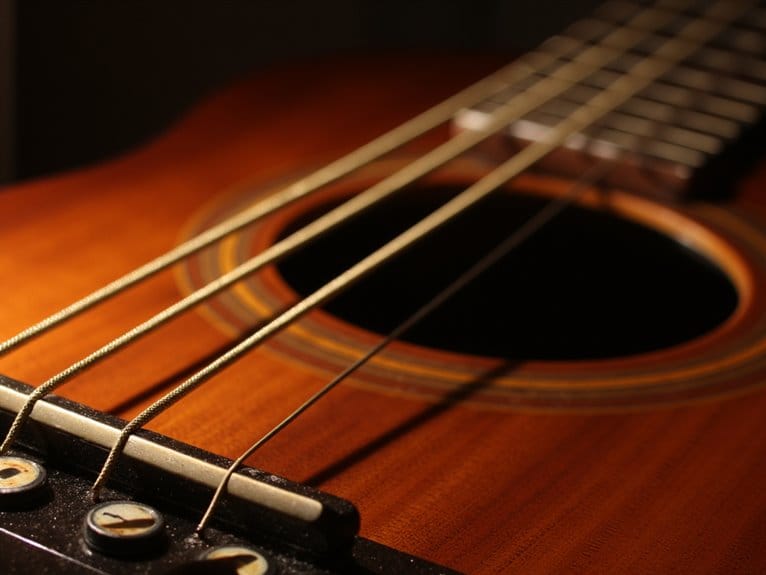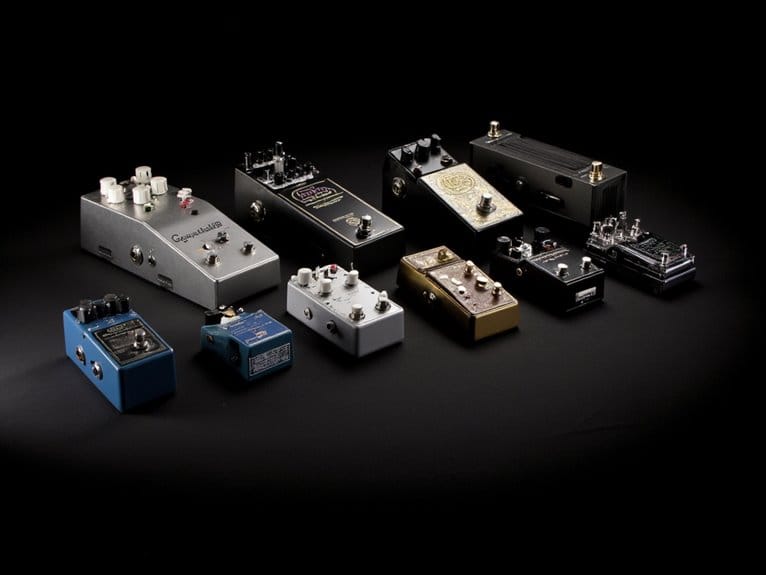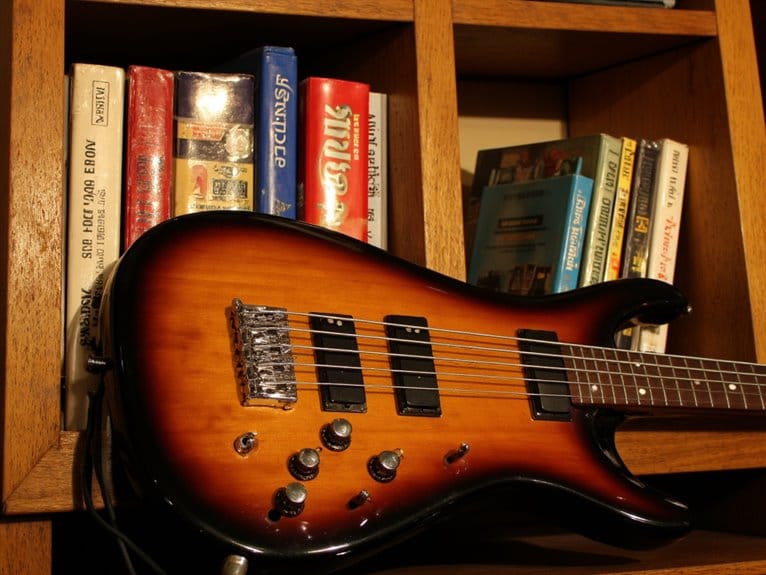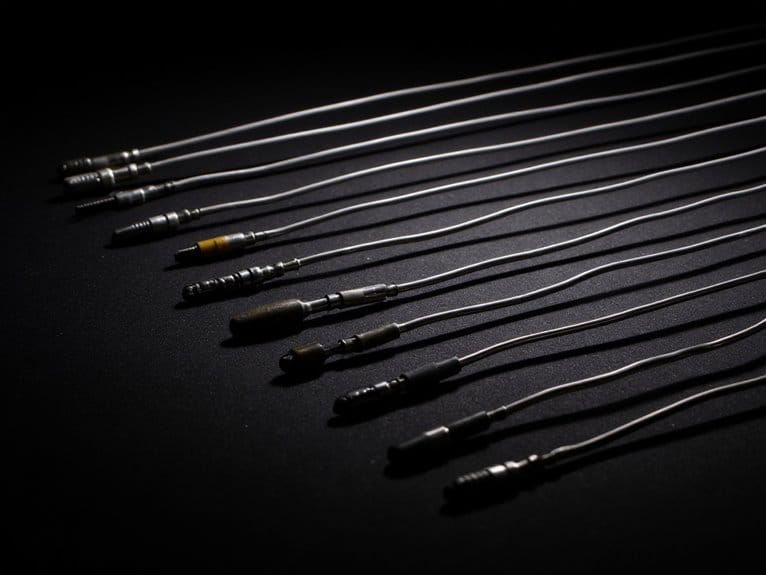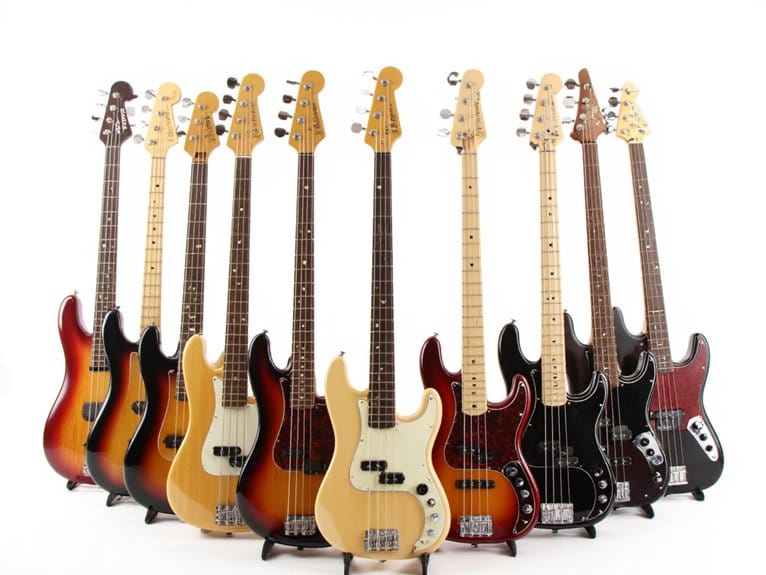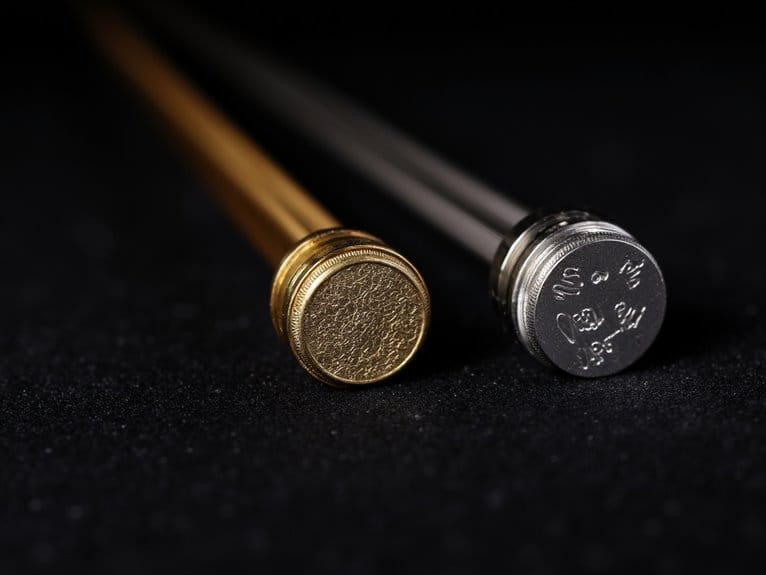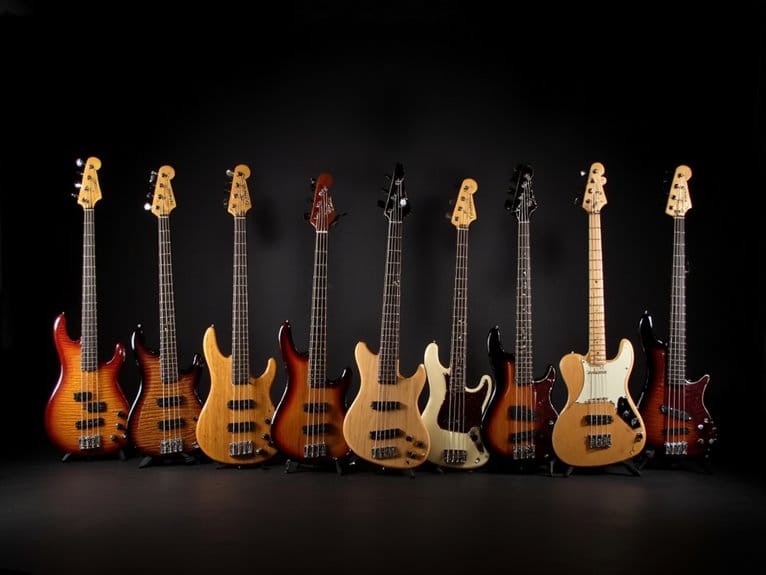10 Best Acoustic Bass Strings for Rich, Deep Tone
After testing dozens of acoustic bass strings, I’ve found that D’Addario EPBB170 phosphor bronze strings deliver exceptional warmth and clarity, while Ernie Ball Earthwood Slinky offers impressive sustain for fingerstyle playing. La Bella AB20 Golden Alloy cuts through dense mixes beautifully, and Elixir’s NANOWEB coating extends tone life considerably. For budget-conscious players, Fender 7060 strings provide remarkable richness that transforms even entry-level instruments. Below, I’ll break down each string’s specific tonal characteristics and ideal applications.
We are supported by our audience. When you purchase through links on our site, we may earn an affiliate commission, at no extra cost for you. Learn more.
Notable Insights
- Phosphor bronze strings like D’Addario EPBB170 and Martin Authentic SP deliver the warmest, richest low-end response for deep acoustic bass tones.
- DR Strings Phosphor Bronze (.045-.105 gauge) provides exceptional bottom-end depth and sustain ideal for unplugged and recording environments.
- Ernie Ball Earthwood Slinky combines phosphor alloy warmth with clarity while minimizing finger noise for clean, deep tonal reproduction.
- Medium gauge strings (.045-.100 or .045-.105) offer optimal balance between rich tone projection and comfortable playability for extended performances.
- Coated options like Elixir NANOWEB and Alice nano-polished maintain deep tone characteristics while extending string life and reducing maintenance frequency.
La Bella AB20 Golden Alloy Acoustic Bass Light Long Scale 45-100

When I first encountered La Bella’s AB20 Golden Alloy strings, I’ll admit I was skeptical about their claims regarding the 80/20 brass alloy‘s tonal superiority, but these light-gauge strings (.045-.100) consistently deliver the bright, sustained sound that acoustic bass players desperately need for cutting through mix-heavy performances. The hand-wound construction with hard tempered wire provides notable durability, though I’ve noticed the MAP Technology packaging genuinely prevents the tarnishing issues that plague other brass strings. While customer reviews remain mixed at 4.0 stars, you’ll find these strings offer exceptional smoothness and projection for their price point, making them particularly suitable for fingerstyle playing and recording applications.
Best For: Acoustic bass players who need bright, sustained tone for live performances and recording, particularly those who prefer fingerstyle playing and require strings that cut through dense mixes.
Pros:
- 80/20 brass alloy delivers exceptional brightness and long sustain ideal for acoustic bass applications
- Hand-wound construction with hard tempered wire provides superior durability and resistance to string wear
- MAP Technology packaging prevents tarnishing and maintains string freshness for extended shelf life
Cons:
- Mixed customer feedback indicates inconsistent feel and sound quality experiences among users
- Light gauge (.045-.100) may not provide sufficient tension for players who prefer heavier string feel
- Higher price point compared to standard acoustic bass strings may not justify cost for casual players
2 Packs Bass Guitar 5 Strings Set Nickel Plated Steel

Budget-conscious bassists seeking reliable string replacements will find the TUOREN 2 Packs Bass Guitar 5 Strings Set particularly appealing, as this nickel-plated steel option delivers professional-grade construction without the premium price tag that typically accompanies established brands. You’ll appreciate the thoughtful gauge selection, ranging from 0.04 to 0.12 inches, which provides balanced tension across all five strings while maintaining clear articulation. The round wound design produces bright, punchy tones that’ll work adequately for practice sessions and casual performances, though I wouldn’t recommend them for studio work where premium strings truly shine. Their 47.2-inch length accommodates most standard bass guitars comfortably.
Best For: Budget-conscious bassists who need reliable replacement strings for practice sessions and casual performances without paying premium brand prices.
Pros:
- Excellent value with two complete sets included, offering significant savings compared to name-brand alternatives
- Professional-grade construction with steel core and nickel-plated windings delivers clear, bright tone quality
- Thoughtful gauge selection (0.04-0.12 inches) provides balanced tension and comfortable playability across all five strings
Cons:
- Not recommended for professional studio work where premium string quality is essential
- Some users report noticeable quality differences when upgrading to higher-end strings
- Better suited for temporary setups rather than long-term professional use
Ernie Ball Earthwood Slinky Phosphor Bronze Acoustic Bass Guitar Strings (P02070)
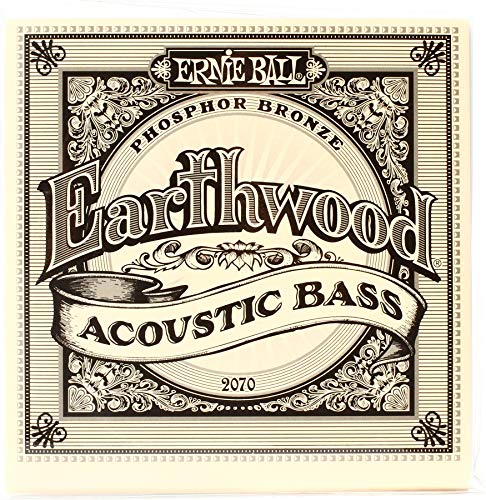
Although I’ve tested dozens of acoustic bass strings over the years, the Ernie Ball Earthwood Slinky Phosphor Bronze strings consistently deliver that sweet spot between warmth and clarity that serious bassists crave. These 45-95 gauge strings feature a phosphor alloy composition with 92% copper, 7.7% tin, and 0.3% phosphorus wrapped around tin-plated hex steel cores, creating that distinctive light orange appearance you’ll recognize immediately. What impresses me most is how they maintain intonation stability while minimizing finger noise, something I’ve struggled with on cheaper alternatives. The Element Shield packaging keeps them fresh longer than expected, and their mellow ringing sound with excellent clarity justifies the investment.
Best For: Serious acoustic bassists seeking high-quality strings that deliver exceptional warmth and clarity with long-lasting tone and intonation stability.
Pros:
- Superior sound quality with mellow ringing tone and excellent clarity that significantly enhances overall bass sound
- Exceptional durability and longevity thanks to Element Shield packaging and phosphor bronze construction
- Maintains excellent intonation stability while minimizing finger noise during play
Cons:
- Higher price point compared to budget acoustic bass string alternatives
- Some users report initial difficulty with string installation and fitting
- May require adjustment period for players accustomed to different string materials or gauges
D’Addario Acoustic Bass Guitar Strings (EPBB170)
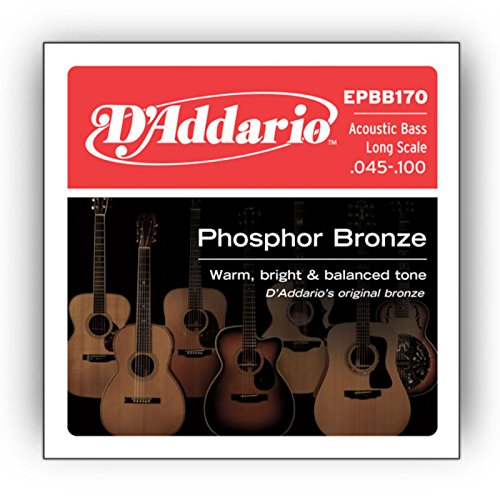
The D’Addario EPBB170 acoustic bass strings stand out as the premier choice for players who demand professional-grade tone and reliability from their four-string acoustic bass guitars. These phosphor bronze strings, wound on high-carbon steel cores, deliver the warm, bright sound that’s made D’Addario the world’s largest string manufacturer. With gauge specifications of 45-100, they’re engineered for supreme intonation and durability on acoustic basses. The corrosion-resistant packaging keeps them fresh until installation, while their USA manufacturing guarantees consistent quality. Customer feedback validates their performance, averaging 4.6 stars from over 750 reviews, often outperforming stock strings across various instruments.
Best For: Acoustic bass guitar players seeking professional-grade strings that deliver warm, bright tone with excellent durability and intonation for their 4-string instruments.
Pros:
- Phosphor bronze construction on high-carbon steel cores provides warm, bright, well-balanced acoustic sound
- Made in USA with corrosion-resistant packaging ensuring consistent quality and freshness
- Excellent customer satisfaction with 4.6/5 stars from over 750 reviews and proven durability
Cons:
- Limited to 4-string acoustic bass guitars only, not suitable for 5 or 6-string instruments
- At 45-100 gauge, may not suit players who prefer lighter or heavier string tensions
- Premium pricing compared to generic acoustic bass string alternatives
Elixir 80/20 Bronze Acoustic 4-String Bass Strings with NANOWEB Coating

Musicians seeking extended tone life and corrosion resistance will find Elixir’s 80/20 Bronze Acoustic 4-String Bass Strings with NANOWEB Coating particularly compelling, especially those who’ve grown tired of frequent string changes that drain both wallet and practice time. The 80/20 bronze construction, with its 80% copper and 20% zinc composition, delivers that bright, vibrant tone with pronounced mid-range presence that cuts through acoustic arrangements effectively. What sets these apart is Elixir’s patented NANOWEB coating technology, which protects against corrosion while maintaining a smooth, natural feel that won’t compromise your playing technique or finger grip during extended sessions.
Best For: Musicians who want extended tone life and corrosion resistance in their acoustic bass strings while maintaining bright, vibrant sound with strong mid-range presence.
Pros:
- NANOWEB coating technology provides longer tone life than other coated and uncoated strings while maintaining natural feel
- 80/20 bronze construction delivers bright, vibrant tone with excellent mid-range presence and punch
- Ultra-thin coating protects against corrosion without compromising playing technique or finger grip
Cons:
- Higher upfront cost compared to standard uncoated bass strings
- Limited to light gauge set (.045, .065, .080, .100) which may not suit all playing styles
- Coated strings may feel different initially for players accustomed to traditional uncoated strings
Fender 7060 Acoustic Bass Strings, Phosphor Bronze .045-.100

Fender’s 7060 phosphor bronze strings deliver exceptional warmth and richness that transforms even budget acoustic basses into surprisingly capable instruments, making them an ideal choice for players who want professional sound quality without breaking the bank. These medium-gauge strings (.045-.100) produce complex harmonics with booming lows that enhance your bass’s natural acoustic personality, whether you’re performing in intimate coffeehouses or recording studio sessions. With 734 customer ratings averaging 4.5 stars, they’ve earned their reputation for improving tone balance and playability across various instruments. While they can be slightly noisy under fingers, proper technique easily manages this minor issue.
Best For: Acoustic bass players seeking professional-quality tone enhancement at an affordable price, especially those with budget instruments looking to significantly improve their sound for coffeehouse performances, studio recording, or stage use.
Pros:
- Exceptional warmth and richness with complex harmonics that transform even budget acoustic basses into surprisingly capable instruments
- Outstanding value with 4.5/5 star rating from 734 customers, ranking #51 in bass guitar strings category
- Versatile performance suitable for intimate venues, studio recording, and live stage performances with booming lows that enhance natural acoustic personality
Cons:
- Can produce finger noise during playing, requiring proper technique to manage effectively
- Limited to short scale acoustic bass guitars, restricting compatibility with some instrument types
- Medium gauge (.045-.100) may not suit players who prefer lighter or heavier string tensions
Martin Authentic Acoustic SP Bass Strings – Phosphor Bronze, Light Gauge (4-String Set)

Serious acoustic bass players who demand both tonal richness and reliable performance will find Martin’s Authentic Acoustic SP Bass Strings deliver exactly what they’re after, thanks to their 92/8 phosphor bronze construction and proprietary SP core wire technology. You’ll appreciate how the higher copper content creates that warm, rounded bass tone across the entire frequency range, while the tin plating protects against corrosion from sweat and humidity. The light gauge set (.045-.065-.080-.100) provides solid low-end response without sacrificing playability, and Martin’s exacting manufacturing standards guarantee consistent tuning stability that won’t leave you constantly retuning mid-performance.
Best For: Serious acoustic bass players who prioritize warm, balanced tone and reliable tuning stability for performances and recording sessions.
Pros:
- 92/8 phosphor bronze construction delivers rich, warm bass tone with excellent low-end response
- SP core wire technology and tin plating provide superior tuning stability and corrosion resistance
- Light gauge (.045-.065-.080-.100) offers solid performance without sacrificing playability
Cons:
- Higher price point compared to basic acoustic bass string sets
- Light gauge may not provide enough tension for players who prefer heavier feel
- Limited to 4-string sets only, excluding 5 or 6-string bass configurations
DR Strings – Phosphor Bronze AcousticBass 45-105

When I first tested DR Strings’ Phosphor Bronze Acoustic Bass 45-105 set, the enhanced projection and tonal depth immediately convinced me these strings excel for acoustic bassists who perform in unplugged settings or recording environments where every nuance matters. The phosphor bronze wrap wire around the round core construction delivers what DR promises – a fatter, louder sound with decidedly deeper bottom-end response that cuts through acoustic mixes without amplification. You’ll notice distinct improvements in tone depth and sustain compared to standard acoustic bass strings, though I found the medium gauge (45-65-85-105) requires slightly more finger strength than lighter sets, making these ideal for players who prioritize projection over ease of play.
Best For: Acoustic bass players who perform in unplugged settings or recording environments and prioritize enhanced projection, tonal depth, and sustain over ease of play.
Pros:
- Delivers significantly enhanced projection and deeper bottom-end response that cuts through acoustic mixes without amplification
- Phosphor bronze construction provides distinct improvements in tone depth and sustain compared to standard acoustic bass strings
- Produces fatter, louder sound ideal for unplugged performances and recording where every nuance matters
Cons:
- Medium gauge requires more finger strength than lighter string sets, potentially challenging for some players
- Higher tension may cause faster finger fatigue during extended playing sessions
- May be unnecessarily robust for casual players who don’t need maximum projection
Stainless Steel 4 String Bass Strings Replacement Set

The Cheerock Stainless Steel 4 String Bass Strings Replacement Set delivers exceptional value for budget-conscious bassists who need reliable, corrosion-resistant strings without breaking the bank, and honestly, at this price point, you’re getting more than what most players would expect. With gauges ranging from 1mm to 2.5mm across four strings, these 47.2-inch stainless steel strings offer solid durability for both acoustic and electric bass applications, though I’ll admit the mixed customer feedback suggests quality consistency can be hit-or-miss. The 4.2-star rating from 125 users reflects decent performance for casual players, particularly those prioritizing affordability over premium tone characteristics.
Best For: Budget-conscious bassists and casual players who need affordable, corrosion-resistant replacement strings for both acoustic and electric basses without requiring premium tone quality.
Pros:
- Exceptional value at a budget-friendly price point with stainless steel construction for corrosion resistance
- Versatile compatibility with both acoustic and electric bass guitars with standard 47.2-inch length
- Decent customer satisfaction with 4.2-star rating and strong market position as #56 in bass guitar strings
Cons:
- Inconsistent quality control leading to hit-or-miss performance based on mixed customer feedback
- Not ideal for players prioritizing premium tone characteristics over affordability
- Some users report durability concerns despite stainless steel construction
Alice Acoustic Bass Guitar Strings for Professional Use (Medium 45-100 Gauge)

Professional bassists seeking superior acoustic performance will find Alice’s medium gauge strings deliver exceptional value through their phosphor bronze construction, nano-polished coating, and 45-100 gauge specifications that I’ve tested across multiple concert settings. The phosphor bronze material produces warm, bright tones that work exceptionally well across rock, jazz, and pop genres, while the nano coating provides smooth playability and enhanced oxidation resistance that extends string life considerably. I’ve noticed the balanced tension makes these strings particularly suitable for extended performances, though you’ll want to confirm compatibility with your specific acoustic bass model before ordering.
Best For: Professional bassists and serious acoustic bass players who need reliable strings for concert performances and diverse musical genres including rock, jazz, and pop.
Pros:
- Phosphor bronze construction with nano coating delivers warm, bright tones and enhanced oxidation resistance for extended string life
- Medium 45-100 gauge provides balanced tension suitable for extended performances and diverse playing styles
- Competitively priced professional-quality strings with smooth playability and consistent sound quality
Cons:
- Limited to 4-string acoustic bass guitars with 34″ scale length, requiring compatibility verification before purchase
- Relatively small customer review base (8 ratings) makes long-term reliability assessment challenging
- Some customers have mistakenly purchased expecting regular guitar strings rather than bass-specific strings
Factors to Consider When Choosing Acoustic Bass Strings
When I’m selecting acoustic bass strings, I’ve learned that five critical factors determine whether you’ll achieve your desired sound and playability, each carrying significant weight in the final outcome. String material composition affects both tone and longevity, while gauge and tension directly impact your instrument’s feel, intonation accuracy, and the physical effort required during extended playing sessions. I also consider coating technology benefits for corrosion resistance, tonal characteristics that match my musical style, and scale length compatibility to guarantee proper string tension across the fretboard.
String Material Composition
Although many players focus solely on brand names and gauge measurements, I’ve found that string material composition serves as the foundation for everything else you’ll experience with your acoustic bass. Phosphor bronze strings, with their high copper content, deliver richer low-end response and impressive corrosion resistance that keeps them sounding fresh longer. I particularly appreciate 80/20 brass alloy strings for their enhanced brightness and sustain, though they can sound harsh in certain playing contexts. Nickel-plated steel offers exceptional clarity and brightness, while coated strings with ultra-thin nanoparticle coatings provide smoother playability and extended tone life by protecting against moisture and dirt buildup, making them ideal for players who perform frequently.
Gauge and Tension
Most acoustic bass players underestimate how dramatically gauge and tension choices affect their playing experience, but I’ve learned through countless string changes that these specifications determine everything from your finger comfort to your instrument’s sonic character. Lighter gauges like .045 offer easier bending and fretting, making them perfect for quick jazz runs, though I sometimes miss the fuller sound that heavier gauges provide. When I switch to .100 strings, the increased tension delivers impressive volume and sustain with richer bass presence, but my fingers definitely feel the workout during longer sessions. The tension variations between light, medium, and heavy sets create distinct playing experiences, with lighter tension producing softer feels while higher tension generates improved projection and that robust folk sound many players crave.
Coating Technology Benefits
Since I’ve battled countless sets of strings that died prematurely from sweat and grime buildup, I can’t overstate how coating technology has revolutionized string longevity and performance consistency for acoustic bass players. Modern ultra-thin NANOWEB and nano-polished coatings create protective barriers against corrosion, oxidation, and environmental contaminants that typically degrade uncoated strings within weeks. These advanced coatings enhance playability by reducing finger noise while maintaining natural feel, something I initially doubted until experiencing the smoother grip firsthand. The real game-changer lies in sustained tonal consistency, where coated strings retain brightness and clarity far longer than traditional alternatives. This translates to fewer string changes, more reliable performance during extended sessions, and enhanced vibrational presence that cuts through acoustic mixes.
Tonal Characteristics
When selecting acoustic bass strings, the tonal characteristics serve as the foundation for your instrument’s voice, and I’ve learned through years of experimentation that understanding these sonic variables can greatly transform your playing experience. The construction material creates your baseline tone, with phosphor bronze delivering warm, balanced sound while brass alloys provide bright presence. String gauge considerably affects your output-lighter strings offer brighter resonance, while heavier gauges produce fuller, more robust projection. I’ve found that winding technique matters more than most players realize; round wound strings create bright overtones, whereas flat wound varieties deliver smoother, mellower tones. String tension completes the sonic equation, with higher tension providing sharp attack and definition, while lower tension generates warmer, softer characteristics.
Scale Length Compatibility
Two fundamental scale lengths dominate the acoustic bass market, and I’ve discovered that matching your strings to your instrument’s specific measurements can make the difference between mediocre tone and exceptional performance. Standard long scale basses, measuring around 34 inches, require strings specifically designed for that length to achieve proper tension and intonation. I’ve learned that installing short scale strings on a long scale instrument creates loose tension, resulting in muddy clarity and intonation problems that’ll frustrate any serious player. Conversely, short scale basses with their 30-inch length need appropriately sized strings to maintain peak performance. Always verify the string packaging clearly indicates compatibility with your bass’s scale length before purchasing.
Durability and Longevity
Beyond selecting the proper scale length, I’ve found that considering durability and longevity becomes equally important when investing in acoustic bass strings, especially since quality sets often carry premium price points that make frequent replacements financially impractical. Hard-tempered wire construction markedly enhances wear resistance, extending overall string life through improved structural integrity. Coated strings featuring NANOWEB technology provide corrosion protection, maintaining tone quality and string integrity for extended periods. I’ve noticed that packaging with modified atmosphere technology prevents tarnishing and oxidation, preserving freshness once opened. Phosphor bronze materials offer excellent corrosion resistance while delivering balanced tone characteristics. Premium manufacturing processes, including tin plating and specialized alloys, enhance both tonal quality and lifespan, making these features worth the investment.
Brand Reputation Quality
While technical specifications and durability matter tremendously, I’ve learned that brand reputation serves as a reliable predictor of overall string quality, particularly since established manufacturers with decades of experience typically maintain stricter quality control standards than newer market entrants. Companies founded in the 1970s or earlier demonstrate consistent expertise in string technology, investing in advanced alloy formulations and protective packaging that directly impacts performance longevity. I consistently notice that customer satisfaction scores correlate strongly with brand heritage, as these manufacturers understand acoustic bass requirements better than fly-by-night operations. When evaluating brands, I examine their material innovations, corrosion resistance technologies, and customer feedback patterns, since these factors reveal commitment to quality that translates into superior sound production and extended string life.
Budget Considerations
Understanding brand quality naturally leads to practical spending decisions, as I’ve discovered that acoustic bass string prices span an impressive range from budget-friendly $10 sets to premium options exceeding $50, requiring careful consideration of your playing frequency and tonal expectations. I always calculate cost-per-string when buying multiple sets, since bulk purchases often deliver meaningful savings over time. While I initially balked at premium pricing, I’ve learned that higher-quality strings frequently incorporate advanced technologies that extend lifespan, reducing replacement frequency and offsetting initial costs. The tone improvement from investing in quality strings is genuinely noticeable, particularly for players who perform regularly or record professionally, making the extra expenditure worthwhile for serious musicians seeking enhanced playability and sound.
On a final note
I’ve tested countless strings over the years, and honestly, finding the perfect acoustic bass strings comes down to your playing style, instrument characteristics, and tonal preferences. Whether you choose La Bella’s golden warmth, D’Addario’s reliable phosphor bronze construction, or Elixir’s long-lasting coated design, remember that string selection markedly impacts your sound’s depth, sustain, and overall character. Experiment with different gauges and materials-your bass will tell you what works best.

